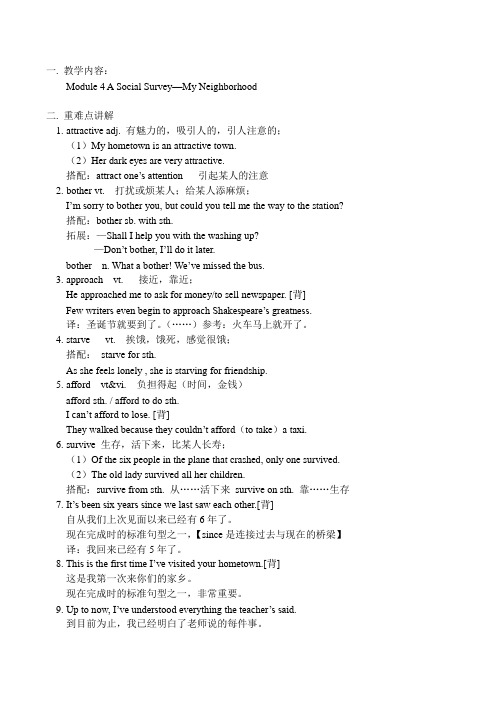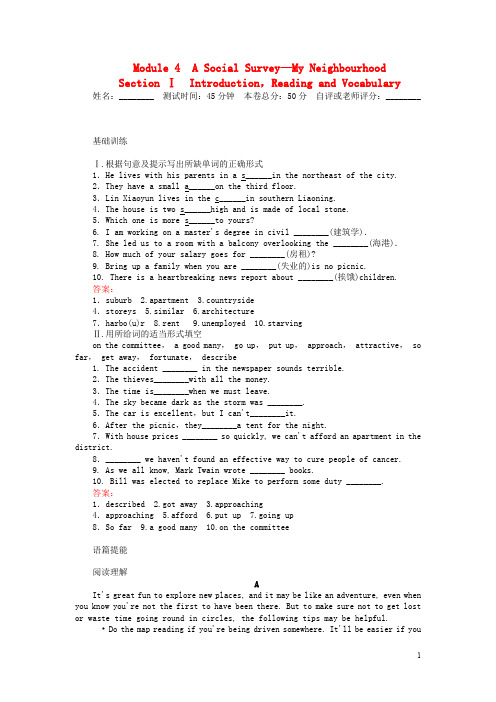山西省吕梁市高中英语 Module 4 A Social SurveyMy Neighbourhoo
高中英语 Module 4 A Social SurveyMy Neighbourhood Modu

—My Neighbourhood
Module Review
第一页,共11页。
Ⅰ. 单词串记(根据构词法完成下面空格)
1. v. +-ive→adj. attract (v. )吸引; 引起(yǐnqǐ)→_________(adj. )有吸引力的; 吸引人的
第三页,共11页。
Ⅱ. 连词成句(用本模块的词汇完成句子, 每空一词) 1. 一项近期的调查表明四分之一的当地劳动力没有工作。 A recent _s_u_r_v_e_yshows that a quarter of the local workforce is __u_n_em__p_lo_y_e_d_. 2. 对一些(yīxiē)人来说, 高房租是致命的。 For some people, the __p_r_e_t_tyhigh ___r_enftor the house is deadly.
The _________ and __________ views in this country attract _______ attractive fascinating
all over the world every year. tourists
第页,共11页。
Ⅲ. 句式点拨 1. 这已经是他本周第五次上学迟到了。(True or False) This is the fifth time this week that he has been late for class.
imagine(v. )想象→___________(aaddj.d)i想cti象ve的
imaginative
第二页,共11页。
2. un-+adj. →adj. 反义词 employed(adj. )被雇用的→_u_n_e_m__p_lo_y_e_d_(adj. )失业的; 没有工 作(gōngzuò)的 【类记】 official(adj. )官方的→_u_n_o_f_f_ic_ia_l_(adj. )非官方的 finished(adj. )完成的→_u_n_f_i_n_is_h_e_d_(adj. )未完成的 real(adj. )真实的→_u_n_r_e_a_l(adj. )不真实的 healthy(adj. )健康的→_u_n_h_e_a_lt_h_y_(adj. )不健康的 comfortable(adj. )舒服的→_u_n_c_o_m__fo_r_t_a_b_le_(adj. )不舒服的
高中英语 Module 4 A Social Survey-My Neighbourhood Sec

2016-2017学年高中英语Module 4 A Social Survey-My Neighbourhood Section ⅣCultural Corner课时作业外研版必修1编辑整理:尊敬的读者朋友们:这里是精品文档编辑中心,本文档内容是由我和我的同事精心编辑整理后发布的,发布之前我们对文中内容进行仔细校对,但是难免会有疏漏的地方,但是任然希望(2016-2017学年高中英语Module 4 A Social Survey-My Neighbourhood Section ⅣCultural Corner课时作业外研版必修1)的内容能够给您的工作和学习带来便利。
同时也真诚的希望收到您的建议和反馈,这将是我们进步的源泉,前进的动力。
本文可编辑可修改,如果觉得对您有帮助请收藏以便随时查阅,最后祝您生活愉快业绩进步,以下为2016-2017学年高中英语Module 4 A Social Survey-My Neighbourhood Section ⅣCultural Corner课时作业外研版必修1的全部内容。
Sec tion ⅣCultural Corner姓名:________ 测试时间:45分钟本卷总分:50分自评或老师评分:________基础训练Ⅰ。
根据句意及提示写出单词的正确形式1.You mustn’t go across the street when the t________ light is red。
2.What’s the rate of e______between the dollar and Renminbi?3.The United Nations is an international o________ which was founded in 1945.4。
I suppose I was looking for an o________ which was going to be an architect。
Module 4 A Social Survey — My Neighbourhood.(知识梳理)

Module 4 A Social Survey — My Neighbourhood重点单词survey, attractive, fortunate, bother, approach, survive, afford, contact, exchange重点短语put up, pay back, so far, a number of重点句型It is\has been + time + since从句This is/was+第几次+(that)+sb. + have/has/had done sth.知识讲解survey【原句回放】A Social Survey-My Neighbourhood 一份社会调查报告——我的街坊邻居【点拨】survey既可作名词,也可做动词,都是“调查”的意思。
“做调查”可用do/make/carry out/conduct a survey into/on...Only 18 percent of those surveyed opposed the idea.被调查者中只有18%的人反对该主张。
The university has r ecently conducted a survey into people’s attitudes to violence on television.这所大学最近开展了关于人们对于电视暴力的态度的调查。
attractive【原句回放】...but this is one of the most attractive places I’ve been to. ……但这是我去过的最迷人的地方之一。
【点拨】attractive adj. 有吸引力的;吸引人的。
表示“对……有吸引力”,后面使用介词to。
The offer is very attractive to us.这一出价对我们具有很大吸引力。
attract vt.吸引attract sb’s attention 引起某人的注意She waved to attract the attention of the waitress.她招手来引起服务员的注意。
山西省吕梁市石楼县石楼中学高中英语《Module 4 A Social Survey My Neighborhood》导学案(无答案)研版必

Module4 A Social Survey—My Neighbourhood Cultural corner
【学习目标】了解西方一些乡村存在的问题。
【学法指导】通过阅读教材,回答相关问题。
【自主预习】掌握短文中的词,短语,重点句型。
【合作探究】
探究1:what ar e these problems in these villages?
探究2:Do villages in your area have similar problems?
【拓展延伸】
1.总结方位,位置的表达法。
(1)上海在中国的东部。
(强调在范围内)
(2)广州在河北的南部。
(强调在范围外)
(3)蒙古在中国的北部。
(强调范围外的接壤)
2.比较the number of和a number of意思及用法。
【我的疑惑】
【思维导图】
The problems of some villages
in western Europe
【课后作业】write a description of your hometown.完成一篇关于介绍你家乡的作文。
(新课标)高中英语 Module 4 A Social Survey My Neighbourh

③考虑到女儿的生日即将来临,史密斯先生想用剩余的 20
美元给她买个礼物。 Considering her daughter's birthday was coming , Mrs Smith wanted to buy remaining 20 dollars the_______________________. her a present with
villagers move to the town and do not return.Secondly,
people move to the cities to find work.Sometimes villages remain because people from the cities have bought a “second home” in the village,where they come and stay at__5__.
4.afford vt. 买得起;有能力支付 His parents couldn't afford his schooling,so he dropped out of school.他的父母付不起他的学费,所以他辍学了。 At present the price of a house is too high, and many people can't afford one.目前房价太高,很多人买不起。
5.weekends
10.without
6.goes up
7.afford
8.survive
9.remain
1.reason n.原因,理由
Don't punish your children for no good reason. 不要莫名其妙地惩罚孩子。 He had to give up teaching for the reason of health. 他由于健康原因不得不放弃教学工作。
高一英语Module 4 A Social Survey—My Neighborhood 教案

一. 教学内容:Module 4 A Social Survey—My Neighborhood二. 重难点讲解1. attractive adj. 有魅力的,吸引人的,引人注意的;(1)My hometown is an attractive town.(2)Her dark eyes are very attractive.搭配:attract one’s attention 引起某人的注意2. bother vt. 打扰或烦某人;给某人添麻烦;I’m sorry to bot her you, but could you tell me the way to the station?搭配:bother sb. with sth.拓展:—Shall I help you with the washing up?—Don’t bother, I’ll do it later.bother n. What a bother! We’ve missed the bus.3. approach vt. 接近,靠近;He approached me to ask for money/to sell newspaper. [背]Few writers even begin to approach Shakespeare’s greatness.译:圣诞节就要到了。
(……)参考:火车马上就开了。
4. starve vt. 挨饿,饿死,感觉很饿;搭配:starve for sth.As she feels lonely , she is starving for friendship.5. afford vt&vi. 负担得起(时间,金钱)afford sth. / afford to do sth.I can’t afford to lose. [背]They walked because they couldn’t afford(to take)a taxi.6. survive 生存,活下来,比某人长寿;(1)Of the six people in the plane that crashed, only one survived.(2)The old lady survived all her children.搭配:survive from sth. 从……活下来survive on sth. 靠……生存7. It’s been six years since we last saw each other.[背]自从我们上次见面以来已经有6年了。
高中英语 Module 4 A Social Survey-My NeighbourhoodSect

2016-2017学年高中英语Module 4 A Social Survey-My NeighbourhoodSection ⅡGrammar课时作业外研版必修1编辑整理:尊敬的读者朋友们:这里是精品文档编辑中心,本文档内容是由我和我的同事精心编辑整理后发布的,发布之前我们对文中内容进行仔细校对,但是难免会有疏漏的地方,但是任然希望(2016-2017学年高中英语Module 4 A Social Survey-My NeighbourhoodSection ⅡGrammar课时作业外研版必修1)的内容能够给您的工作和学习带来便利。
同时也真诚的希望收到您的建议和反馈,这将是我们进步的源泉,前进的动力。
本文可编辑可修改,如果觉得对您有帮助请收藏以便随时查阅,最后祝您生活愉快业绩进步,以下为2016-2017学年高中英语Module 4 A Social Survey-My NeighbourhoodSection ⅡGrammar课时作业外研版必修1的全部内容。
Section ⅡGrammar姓名:________ 测试时间:45分钟本卷总分:50分自评或老师评分:________基础训练Ⅰ.用所给动词的正确时态和语态填空1。
In the past few years, great changes ________(take) place in my hometown.2. When I first ________(watch) this film, but I ________(change) my mind until now。
3.In fact, I ________(be)to London once。
I ________(visit) the city in 2006.4.His novel ________(republish) several times since it ________(come) out three years ago。
山西省吕梁市高中英语 Module 4 A Social Survey-My Neighbour

Module 4 A Social Survey — My Neighbourhood I.模块教学目标II. 目标语言III. 教材分析与教材重组1. 教材分析本模块的中心话题是A Social Survey — My Neighbourhood,围绕如何介绍居住地或所熟悉的城市展开。
谈论的话题涉及描述居住地、指示地点和方向、了解社区居委会等。
旨在通过本模块的学习,使学生学会使用一些描述某一地方的词汇,以及就neighbourhood这一话题发表自己的观点,并能通过进行社会调查,写出描述neighbourhood近期变化以及居委会工作及所起作用的一篇调查报告。
1.1 INTRODUCTION介绍了一些与建筑、居住地以及某个地方有关的词汇,以及两篇学生描述自己neighbourhood的示范小短文,使学生初步了解这些词的意义,为本模块的学习奠定良好的基础。
1.2 READING AND VOCABULARY部分提供了一段对话,介绍厦门市的地理位置、气候及城市概况。
让学生阅读文章后完成练习,培养学生的快速阅读能力,以及对词汇的认读和应用能力。
1.3 GRAMMAR 1部分要求学生通过分析句意了解现在完成时,并能够区分一般过去时与现在完成时。
1.4 LISTENING AND VOCABULARY部分含两篇关于社区的对话形式的听力材料。
要求学生在听完一段材料后,能够抓住大意并获取自己所需的一些数据信息。
1.5 GRAMMAR 2部分学习两类不同动词,即延续性动词和非延续性动词在现在完成时中的用法,并要求学生学会正确运用。
1.8 EVERYDAY ENGLISH部分使学生通过做选择题掌握七个日常用语的意义,达到会正确使用的目的。
1.9 FUNCTION AND SPEAKING部分要求学生练习怎样指示方向及地点,并能在对话练习中熟练运用。
1.10 CULTURAL CORNER是一篇介绍西欧农村生活变化的文章,使学生了解一些关于西方国家社会生活的知识。
高中英语 Module 4 A Social SurveyMy Neighbourhood Sect

Module 4 A Social Survey—My Neighbourhood Section ⅠIntroduction,Reading and Vocabulary 姓名:________ 测试时间:45分钟本卷总分:50分自评或老师评分:________基础训练Ⅰ.根据句意及提示写出所缺单词的正确形式1.He lives with his parents in a s______in the northeast of the city.2.They have a small a______on the third floor.3.Lin Xiaoyun lives in the c______in southern Liaoning.4.The house is two s______high and is made of local stone.5.Which one is more s______to yours?6. I am working on a master's degree in civil ________(建筑学).7. She led us to a room with a balcony overlooking the ________(海港).8. How much of your salary goes for ________(房租)?9. Bring up a family when you are ________(失业的)is no picnic.10. There is a heartbreaking news report about ________(挨饿)children.答案:1.suburb 2.apartment 3.countryside4.storeys 5.similar 6.architecture7.harbo(u)r 8.rent 9.unemployed 10.starvingⅡ.用所给词的适当形式填空on the committee, a good many, go up, put up, approach, attractive, so far, get away, fortunate, describe1. The accident ________ in the newspaper sounds terrible.2.The thieves________with all the money.3.The time is________when we must leave.4.The sky became dark as the storm was ________.5.The car is excellent,but I can't________it.6.After the picnic,they________a tent for the night.7.With house prices ________ so quickly, we can't afford an apartment in the district.8.________ we haven't found an effective way to cure people of cancer.9. As we all know, Mark Twain wrote ________ books.10. Bill was elected to replace Mike to perform some duty ________.答案:1.described 2.got away 3.approaching4.approaching 5.afford 6.put up 7.going up8.So far 9.a good many 10.on the committee语篇提能阅读理解AIt's great fun to explore new places, and it may be like an adventure, even when you know you're not the first to have been there. But to make sure not to get lost or waste time going round in circles, the following tips may be helpful.• Do the map reading if you're being driven somewhere. It'll be easier if youkeep the map following the direction you're traveling in. Keep looking ahead so that you can give the driver lots of warning before having to make a turn or you'll have to move to the back seat.•Get a group of friends together and go exploring. You'll need a good map,a compass, a raincoat, a cell phone to call for help in case you get lost, and a bit of spare cash for emergencies. Tell someone where you're going before you set out and let him know what time you expect to be back. The purpose of the activityis in not getting lost, not in seeing how fast you can go, so always stick together, waiting for slower friends to catch up.•See if your school or a club organizes orienteering(越野识途比赛) activities, in which you need a map and a compass to find your way. This can be done as a sport, with teams trying to find the way from A to B (and B to C,etc.) in the fastest time, or simply as a sparetime activity. It enables you to be famili ar with the use of maps and compasses and gain some practical skills.In some way,it's not only good fun, but also a great way to keep fit.No matter which way you choose,it's not only good fun, but a great way to keep fit.1.Sitting beside the driver, you should ________.A.direct the driver when necessaryB.look ahead to see where there's a gas stationC. move to the back seat if feeling uncomfortableD. keep looking at the map to find another place to go to2. Why do you need to wait for the slower friends in the exploration ?A. To show them how fast you can go.B. To avoid yourself or your friends getting lost.C. To share the fun with him/her in exploration.D. To tell him/her what's going on with the group members.3. Orienteering activities can ________.A. make people work fastB. help people stay healthyC. help people organize other activitiesD. make people get prepared for sports4. The text mainly talks about ________.A. the fun of explorationB. what to bring for explorationC. the way to use a map in explorationD. how to prevent people getting lost in exploration答案:本文是一篇说明文,主要介绍了一些能够让我们在旅行时避免迷路的好方法。
- 1、下载文档前请自行甄别文档内容的完整性,平台不提供额外的编辑、内容补充、找答案等附加服务。
- 2、"仅部分预览"的文档,不可在线预览部分如存在完整性等问题,可反馈申请退款(可完整预览的文档不适用该条件!)。
- 3、如文档侵犯您的权益,请联系客服反馈,我们会尽快为您处理(人工客服工作时间:9:00-18:30)。
Module 4 A Social Survey — My NeighbourhoodThe Third Period GrammarTeaching goals 教学目标1. Target language目标语言a. 重点词汇和短语traffic, present(n.), repaint, bathroom, furniture, decorate, so far, up to now, till now, all one’s lifeb. 重点句式The traffic in the city has got much worse recently. P34Xiao Li has stayed in Xiamen all his life. P34I’ve worked for it for four years now. P36I’ve known him since September. P36It’s been very successful, so far. P36Up to now, I’ve understood everything the teacher’s said. P36We’ve had very good weather this winter, till now. P362. Ability goals能力目标Learn to use present perfect tense.3. Learning ability goals学能目标Teach the students learn how to use present perfect tense.Teaching important points教学重点The differences between past simple tense and present perfect tense.Teaching difficult points 教学难点Present perfect tense with verbs to describe events happen at a particular point in time and to describe events that can continue over a period of time.Teaching methods教学方法Explanation and practising.Teaching aids教具准备A computer, a projector and some slides.Teaching procedures & ways教学过程与方式Step I Greetings and RevisionT: Good morning / afternoon, everyone!Ss: Good morning / afternoon, Mr / Ms...T: In the last period, I asked you to find out the sentences using present perfect tense in the text. Have you found them?Ss: Yes.T: OK! Now one student, one sentence. And I will ask you some questions according to the sentences you offer. Volunteer?S1: It’s been six years since we last saw each other, you know.T: I have a question. When was the last time that the speaker saw his friend?S1: The last time that the speaker saw his friend was six years ago.S2: This is the first time I’ve visited your hometown.S3: I’ve seen quite a lot of China.T: Do you know when the speaker saw these places?S3: I think the speaker saw these places before he talks to Xiao Li.S4: I’ve visited some beautiful cities.T: Do you know when the speaker visited these cities?S4: I think he visited these cities before he visits Xiao Li’s hometown.S5: They’ve just completed it.T: Is this a recent event?S5: Yes, this is a recent event.S6: They’ve put up a lot of high-rise buildings recently.T: Did they do this a long time ago?S6: No, th ey did this not long ago. “Recently” means “not long ago; lately”.S7: My wife’s just bought a beautiful dress from one of the shops there.S8: A friend’s told me about a nice little fish restaurant near here.T: Did this happen recently?S8: Yes, I think so.Step II Grammar 1T: Now please turn to page 34, and do Activity 2.A few minutes later, ask the students to check the answers. Then let the students work in pairs to talk about an interesting place they have been to to practice the present perfect tense.T: OK! Now please work in pairs and tell your partners about the interesting places that you have been to. Tell your partners when you went and what you did there. And ask if they have been there. Don’t forget to use the present perfect tense.A sample version:S1: Hi! I haven’t seen you for several months. Where have you been?S2: I have been to France.S1: Really! When did you go there?S2: I went there three months ago. I studied two courses. France is a wonderful place. There are a lot of tourist attractions. Have you been there?S1: No. I wish I could have your luck.Explanation:1.一般过去时所关心的是过去某时发生的动作,与现在无联系,常有表示过去某时的状语;而现在完成时所关心的是过去发生的动作和现在的联系或对现在产生的影响,强调过去与现在的关系。
2.一般过去时常带有表示过去某时刻的时间状语,例如last night, yesterday, last year, three months ago等;而现在完成时所带时间状语包括说话时在内或与说话时非常接近,例如today, these days, recently, just等。
3.现在完成时与for或since引起的短语连用时,表示从过去开始的动作或状态延续至今;而一般过去时与for引起的短语连用时,只指过去的动作或状态在过去延续了多长时间。
Let the students do Exercise 3 on page 85 of WORKBOOK to further practice the present perfect tense and enable them to distinguish between the present perfect tense and the past simple tense. T: Please turn to page 85 and do Exercise 3 to choose correct forms of the verbs.Check the answers after the students finish it.Step III Grammar 2Let the students do some exercises to enable them to distinguish verbs that can last and that cannot last.T: Now please look at some verbs on the screen and classify them into two groups. One group is verbs to describe events that can continue over a period of time. And the other group is verbs to describe events that happen at a particular point of time.Show the words on the screen.work, start, join, borrow, buy, give, know,leave, live, open, put, remain, send, stayA few minutes later, check the answers.Sample answers:Verbs to describe events that can continue over a period of time: work, know, live, remain, stay Verbs to describe events happen at a particular point in time: start, join, borrow, buy, give, leave, open, put, and sendT: Now let’s do some practice to see how these verbs are used in past prefect tense. Turn to page 36 and do Activity 3. When you do it, please pay attention to the verbs to see which group they belong to, A or B?After a few minutes, check the answers.Explanation:在现在完成时态中,非延续性动词不能和表示延续概念的“for +一段时间”的时间状语连用,在此时可用与其意义对应的状态性短语来表示。
